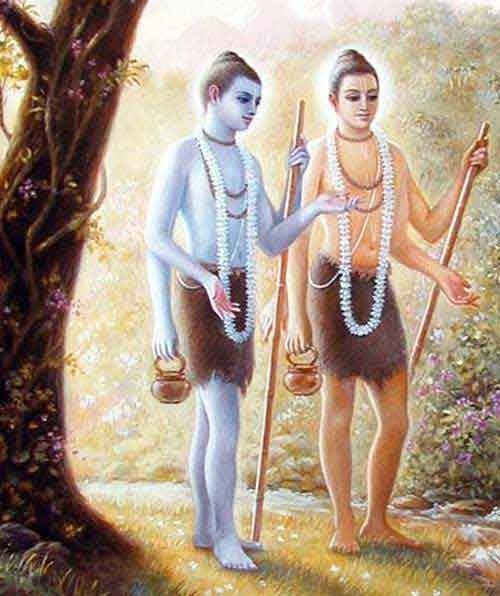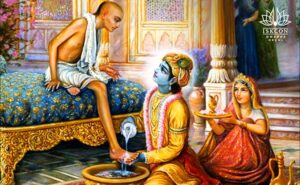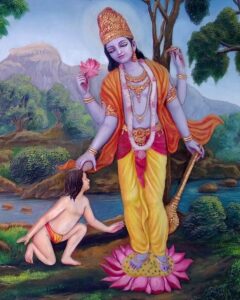In the sacred region of Badrikasram, nestled in the Himalayan mountains of present-day Uttar Pradesh, the Supreme Lord descended in the form of Nara Narayan Rishis. This place, known as Badrinath, is revered as the site where the Lord of Vaikuntha, the husband of the goddess of fortune, appeared to perform intense tapasya (austerities) for the purification of the world. The Lord, who resides eternally in the spiritual realm, surrounded by His intimate devotees and immersed in the highest bliss, came to this world of birth and death out of His infinite compassion to attract us back to His abode of eternal happiness.
Nara Narayan Rishi’s tapasya was beyond anything that had ever been done. While many people may fast or endure physical discomforts in the name of austerity, the tapasya performed by Nara Narayan Rishi was on a level that even Lakshmi Devi, the goddess of fortune, could not bear to witness. She incarnated as the Badri tree to provide shade and warmth to her beloved Lord during His austerities, allowing her to stay close to Him. This is why Krishna is known as Badrinath, the Lord of Lakshmi, who appeared as the Badri tree.
Indra’s Fear and Attachment
While the world worshipped Nara Narayan Rishi for His great compassion, Indra, the king of the heavens, became fearful. Despite his wisdom and power, Indra’s attachment to material opulence, prestige, and power clouded his judgment. The Bhagavad Gita teaches that those who are too attached to sense objects and material wealth have their intelligence clouded, making it difficult to focus on pure devotion.
Indra, thinking that Nara Narayan Rishi was performing tapasya to take over his kingdom, became paranoid. This is the nature of attachment: it breeds fear and envy. Indra’s insecurity led him to believe that Nara Narayan Rishi wanted his kingdom, his palace, and his wife, so he decided to destroy Him.
The Futile Attempt to Distract Nara Narayan Rishi
Indra sent the most beautiful apsaras (heavenly damsels) to distract Nara Narayan Rishi. These celestial maidens created an atmosphere filled with sweet songs, fragrant flowers, and cool breezes designed to stir desires in the heart. However, Nara Narayan Rishi, being the Supreme Personality of Godhead, was entirely unaffected. He is atmarama, self-satisfied, and does not require any material pleasure.
When the apsaras’ charms failed, even Cupid (Madana) himself tried to incite desire in Nara Narayan Rishi. But the Lord, disgusted by their attempts, responded by creating damsels from His own body, far more beautiful than those sent by Indra. Realizing their grave mistake, the apsaras and Cupid bowed down, begging for forgiveness. Nara Narayan Rishi, in His compassion, forgave them and sent one of the divine damsels He created as a gift to Indra.
The Lord’s True Satisfaction: Devotion
Through this incident, the Lord demonstrated that He is the source of all bliss (sat-cit-ananda vigraha) and is not dependent on the temporary pleasures of this world. Yet, despite being self-satisfied, Krishna is bhakta vatsala, always eager to accept offerings made with devotion. The Lord is pleased not by the material wealth or grandeur of our offerings, but by the sincerity and humility with which they are given.
Conclusion: The Essence of Devotional Life
The story of Nara Narayan Rishi and the teachings of Lord Caitanya remind us that true spiritual progress is not about external achievements or material possessions. The essence of devotional life lies in humility, sincerity, and unwavering devotion to the Lord. By serving the devotees and chanting the Holy Names, we can attain the highest perfection and eternal happiness in the loving service of Krishna.



